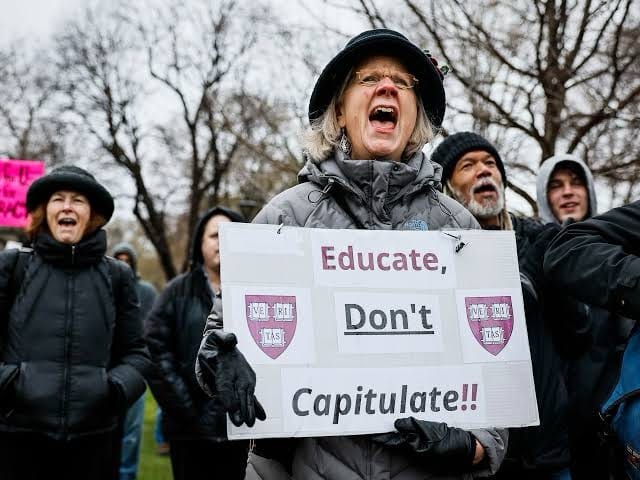Harvard defies Trump demands as $2.2b in federal funding is frozen
Harvard University is facing a massive financial blow after the Trump administration froze $2.2 billion in federal funding on Monday, following the school’s refusal to comply with a sweeping set of government demands aimed at cracking down on alleged campus anti-Semitism.

File Source: Axios
Harvard University is facing a massive financial blow after the Trump administration froze $2.2 billion in federal funding on Monday, following the school’s refusal to comply with a sweeping set of government demands aimed at cracking down on alleged campus anti-Semitism.
The elite Ivy League institution was instructed to overhaul its governance, admissions, and hiring practices, shut down diversity offices, and cooperate with immigration screenings of international students—measures outlined in an April 3 directive and expanded upon last week. Harvard refused, prompting an immediate financial retaliation from the White House’s Joint Task Force to Combat Anti-Semitism.
In a strongly worded letter to students and faculty, Harvard president Alan Garber declared that the university would not yield. “The school would not negotiate over its independence or its constitutional rights,” he said, emphasizing Harvard’s commitment to academic freedom and institutional autonomy.
The Trump task force responded with a statement justifying the funding freeze, which includes halting $60 million in government contracts: “Harvard’s statement today reinforces the troubling entitlement mindset that is endemic in our nation’s most prestigious universities and colleges—that federal investment does not come with the responsibility to uphold civil rights laws.”
“The disruption of learning that has plagued campuses in recent years is unacceptable. The harassment of Jewish students is intolerable. It is time for elite universities to take the problem seriously and commit to meaningful change if they wish to continue receiving taxpayer support,” the statement added.
The clash comes amid a nationwide uproar over pro-Palestinian student protests that erupted in response to Israel’s war in Gaza, ignited by Hamas’s deadly October 7, 2023 attack. Some demonstrations led to confrontations with police and pro-Israel counter-protesters, drawing condemnation from Republicans who accused activists of supporting Hamas, a U.S.-designated terrorist organization.
In March, the Department of Education announced investigations into 60 colleges and universities for alleged “anti-Semitic harassment and discrimination.” Harvard’s federal funding was placed under review at the time, with the administration sending an initial list of demands. On Friday, the government followed up with a more detailed directive, which included an “audit” of student and faculty views. Harvard made the document public, further fueling the standoff.
Garber stood firm, stating that while Harvard remains “open to new information and different perspectives,” it will not comply with directives that “go beyond the lawful authority of this or any administration.” He added, “No government—regardless of which party is in power—should dictate what private universities can teach, whom they can admit and hire, and which areas of study and inquiry they can pursue.”
The administration’s crackdown has been praised by key Republicans, including Rep. Elise Stefanik, who last year aggressively questioned university leaders over campus anti-Semitism. She called for Harvard to be fully defunded, describing it as “the epitome of the moral and academic rot in higher education,” and accusing the school of tolerating “raging anti-Semitism.”
Harvard’s defiant stance contrasts sharply with Columbia University, which was also targeted after last year’s protests. Columbia saw $400 million in grants cut, but responded by agreeing to reform disciplinary procedures and hire dozens of new security officers.
Meanwhile, immigration authorities have ramped up enforcement against protest leaders. Mahmoud Khalil, one of Columbia’s pro-Palestinian organizers, is facing deportation proceedings, and Mohsen Mahdawi was arrested Monday during a citizenship interview.
Despite recording a $45 million surplus last year on $6.5 billion in revenue, Harvard now faces intense financial and political pressure as the administration escalates its campaign against what it calls campus extremism.










